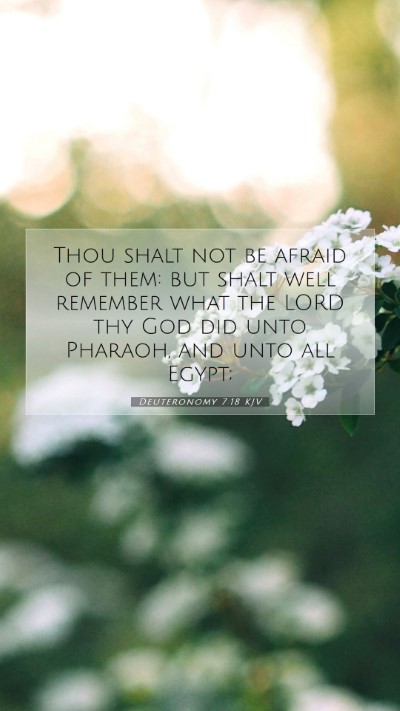Understanding Deuteronomy 7:18
Deuteronomy 7:18 states, "Thou shalt not be afraid of them: but shalt well remember what the Lord thy God did unto Pharaoh, and unto all Egypt." This verse serves as a reminder of God's powerful acts and His unwavering support for the Israelites as they face their adversaries. Below is a comprehensive Bible verse commentary based on insights from public domain commentaries by Matthew Henry, Albert Barnes, and Adam Clarke.
Bible Verse Meanings and Interpretations
The essence of this verse underscores several important themes:
- Divine Assurance: The phrase "Thou shalt not be afraid of them" emphasizes the importance of faith over fear. God urges the Israelites to recall His past deeds as a source of strength.
- Remembrance of God's Providence: The instruction to "well remember" what God did in Egypt serves as a pivot to strengthen their trust in God’s ability to intervene.
- Historical Context: This command reflects the Israelites' upcoming encounters with various nations and their need to trust in the Lord, drawing strength from their shared history of divine deliverance.
Commentary Insights
According to Matthew Henry, the exhortation not to be afraid of their adversaries echoes a larger biblical theme of reliance on God's power. He emphasizes how remembering God's deliverance from Egypt fortifies one's faith against future fears.
Albert Barnes adds that this reminder serves a dual purpose: it not only reassures the people but also calls them to mindfulness regarding the nature of their covenant with God. The history of Egypt is not merely a story, but a crucial element of their identity as a chosen people.
In the view of Adam Clarke, the past is a key to understanding the present and future. Clarke posits that the recollection of God's past interventions is critical in nurturing a robust spiritual foundation, promoting courage in the face of uncertainty.
Application of the Verse in Daily Life
This verse's teachings extend beyond its historical context and resonate deeply with contemporary believers. Here are practical applications:
- Overcoming Fear: In moments of fear or uncertainty, recalling past experiences of God’s faithfulness can bolster confidence and courage.
- Building Faith: Engaging in regular Bible study to reflect on God's deeds not only enhances one’s understanding of Scripture but also cultivates a resilient faith.
- Community Support: Discussing such verses in bible study groups helps collective memory of God’s faithfulness and fortifies the community’s faith.
Historical Context and Cross References
Understanding the historical backdrop of Deuteronomy provides deeper insights into this verse. The Israelites were on the brink of entering the Promised Land after years of wilderness wandering. The mention of Pharaoh and Egypt serves as a reminder of both oppression and miraculous liberation.
Related Bible Cross References:
- Exodus 14:13-14: "And Moses said unto the people, Fear ye not, stand still, and see the salvation of the Lord…"
- Isaiah 41:10: "Fear thou not; for I am with thee: be not dismayed; for I am thy God…"
- Psalms 77:11-12: "I will remember the works of the Lord: surely I will remember thy wonders of old."
Conclusion
Deuteronomy 7:18 is a powerful affirmation of faith in God’s providence in both historical and present contexts. Engaging in bible study lessons centered around such verses enhances understanding and empowerment for daily life challenges.


